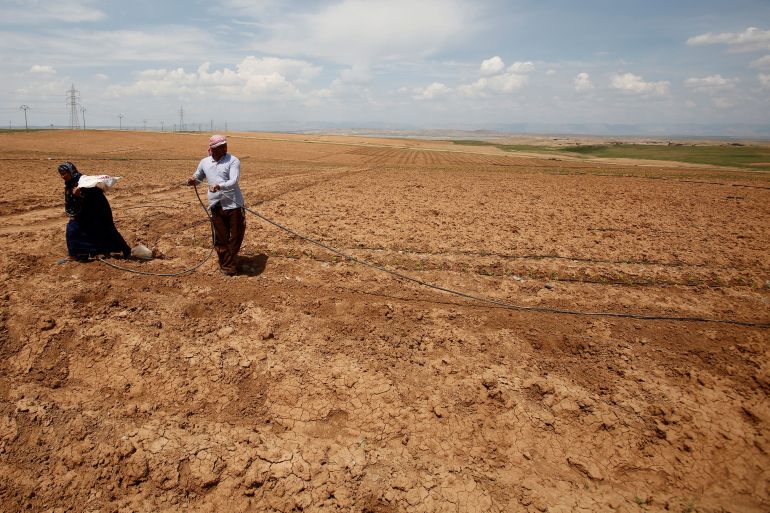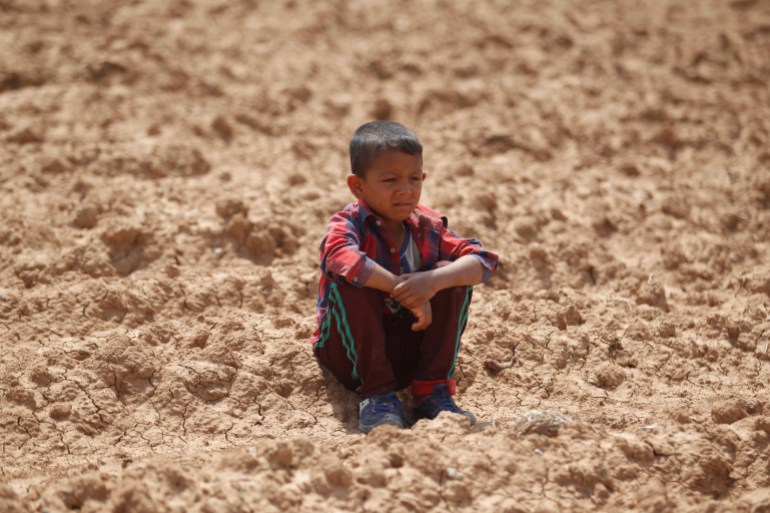No water, no jobs: ISIL survivors struggle in northern Iraq
Battered by violence, Christians face a confluence of environmental and economic hardships in post-conflict Nineveh Plains.

When Father Ammar Yako, a Syriac Catholic priest in the majority-Assyrian Christian town of Qaraqosh in northern Iraq, returned to his church in 2016 he found its floors covered in rubble and its artwork pillaged.
After two years of control by the armed group ISIL (ISIS), Qaraqosh, including the Great Immaculate Church where Yako preaches, had been subjected to looting and urban warfare before it was recaptured by Iraqi security forces and allied militias.
Keep reading
list of 4 itemsIn Pictures: Pope Francis’s historic visit to Iraq
Pope Francis’s visit to Iraq: Beyond the symbolism
Iran-backed PMFs are destabilising Iraq’s disputed regions
Five years later with his church rebuilt, Yako’s congregation received a visit from none other than Pope Francis. But two months on from the pontiff’s historic trip, Yako foresees a grim future for his community as it battles a tense security situation and a host of more immediate concerns.
“From 2006 until 2014, when IS entered, there was an economic and commercial recovery in Qaraqosh,” Yako said. “The economic situation now in general is not good. The damaged area’s capital funds – there are no such thing. The economy is static in the city.”
After fleeing the ISIL onslaught, many Christians who returned to their millennia-old towns in northern Iraq’s Nineveh Plains have found themselves unable to make a living amid a depressed post-war economic environment. Like elsewhere in Iraq, the agricultural sector in Nineveh has been affected in recent years by climate change, a lack of reliable access to water, and state corruption and mismanagement.
But for a minority community struggling to get back on its feet, the decline of farming and commerce in what was once Iraq’s breadbasket has further magnified threats to the continued presence of Christians in the area, as thousands of people displaced in the conflict with ISIL have chosen to move abroad rather than gambling on an insecure future at home.
“The climate there, there are many challenges – challenges that need a real state who see where [there can] be serious solutions for them,” said Pascale Warda, president of the Hammurabi Human Rights Organization in Baghdad. “Iraq is very rich in agriculture as well as on the industrial side, but all are dying because of [lack of care].”
‘Administrative corruption’
Warda, an Assyrian Christian herself, lamented inefficiencies, delays in providing farmers with seeds, and a general lack of investment by the Iraqi state in rebuilding communities and supporting farmers in northern Iraq in the post-ISIL years.
According to the US Department of Agriculture’s Foreign Agricultural Service, the production of barley, corn, and rice in Iraq is expected to fall in the fiscal year 2021-2022 because of water shortages, while wheat is expected to rise. But farmers in northern Iraq may not be able to benefit from even these partial increases.
Residents and analysts alike have noted how, because of ISIL’s occupation, post-war financial difficulties, and the more recent pandemic-induced global economic contraction, the Iraqi state has been unable to pay farmers in full for crops they have bought after each harvest, decimating the finances of wheat farmers in particular.
John Dakali is a resident of Al-Qosh, a heavily agricultural Christian village in Nineveh that successfully repelled an attack by ISIL in 2014. He said farmers there have only recently begun to be repaid by the government, and some have still not received any compensation since the war.
“Most of them feel that they are going to make a lot of effort to spend a lot of money, and at the end of the season, the government will not be able to pay all of their money,” Dakali said. “They are disappointed about that. That’s why they are not so active as before.”
According to Zahra Hadi Mahmood, a professor of the economics of agricultural engineering at the University of Baghdad, this has led to the exploitation of farmers.
“The efforts exerted by the state were not good enough to support farmers,” she said, “which has led to the emergence of the wholesalers’ circle, a circle of administrative corruption as they buy the wheat crop at a low price and sell it to the state. This led to the deterioration of the financial condition of the farms.”
Mahmood added because ISIL destroyed sprinklers in Nineveh that farmers had relied on to water their crops, agriculture in the area has come to rely solely on rainfall. Numbers recorded in nearby Mosul through 2017 indicate fairly healthy amounts of rain in recent years. But in the time since then, droughts and bouts of irregular rainfall have plagued Iraq’s north, according to residents and local farmers.
“This year our farms are zero – there is no rain, never,” said Basim Boka, an agricultural landowner in Al-Qosh. “There is no irrigation. All our farms rely on rain and the Lord.”

‘Dust bowl’
The United Nations Environment Programme called Iraq the “fifth most vulnerable country in the world” to several climate change-related factors in a 2019 report.
Although the most dramatic shifts so far have taken place in the country’s rapidly drying south, according to a Reuters special report from 2018, a combination of intermittent droughts and underdeveloped irrigation infrastructure is slowly turning the Iraqi Christian heartland into a “dust bowl”.
Damming of the Tigris and other rivers upstream in Turkey and Iran have also threatened Iraq’s water supply, with a new dam on the upper Tigris in Turkey that began operations late last year.
In 2014, Nabil Musa of the NGO Waterkeepers Iraq-Kurdistan undertook a trip along the Tigris in northern Iraq near the Mosul Dam, where he and his colleagues encountered farmers along the river who said they would no longer be able to farm in the area because of conflicts and climate change.
“The landscape especially around the river, it changes because of the climate change plus human impact as well,” Musa said. “I think we’re going to be the first hit when it comes to climate change and the impact of it. It’s already here and we are not ready at all for that.”
Back in Qaraqosh, residents said the combined effects of war and a poor economic sector have become too much to bear for some.
“We have a proverb that says ‘two blows on the head hurt’,” said Akad Alkhodedy, a resident of Qaraqosh, “which means a human can deal with one challenge, but two problems become hard to take. Therefore, a lot of Christians migrated from Iraq especially after [ISIL] took over our towns and villages because they became hopeless to get recovered from these scenarios.”
‘Just words, not practice’
According to the Assyrian Policy Institute in Washington, DC, the population of Assyrian Christians in Iraq has fallen from 1.5 million in 2003 to less than 200,000 in 2019. The institute reported as of 2020, only about half of the Christian population in the Nineveh Plains had returned to their homes.
Reine Hanna, the institute’s executive director, said damage caused by ISIL has made returning to their lands unsustainable for many Christians.
“It immediately threatens their ability to return and it threatens their ability to stay in the long term,” Hanna said. “Apart from the destruction, in some cases just due to the way that security is divided right now, there are farmers that may not even have access to their farmlands.”
All things told, Qaraqosh is one of the luckier towns in the area. Seventy percent of the town’s prewar residents have returned, and according to Alkhodedy and several analysts, non-governmental organizations and foreign donors there have been able to rebuild infrastructure more than in other towns in the area. Still, they said, the lack of a state-led reconstruction effort has hampered the rehabilitation of the economy.
“[Iraqi Prime Minister] Mustafa al-Kadhimi, he promised to help the Christians to solve this problem and to help them to grow their area,” said Karokh Khoshnaw, head of the American-Kurdish Research Institute in Erbil, Iraqi Kurdistan. “But until now, they are just words, not practice, [and] they are not doing anything yet.”
Amid security challenges and economic uncertainty, thousands of people, including members of Dakali’s own family, have left Iraq for greener pastures. Dakali himself lost work opportunities in the aftermath of the ISIL invasion. Yet despite the litany of challenges facing them, he, Alkhodedy, and many others in Nineveh have made the conscious decision to stay and weather the storm.
“This is my hometown where me, my father, and ancestors were born and lived for thousands of years,” Alkhodedy said. “We consider this area and fields [to be] like a mother. No one wants to leave his mother.”
